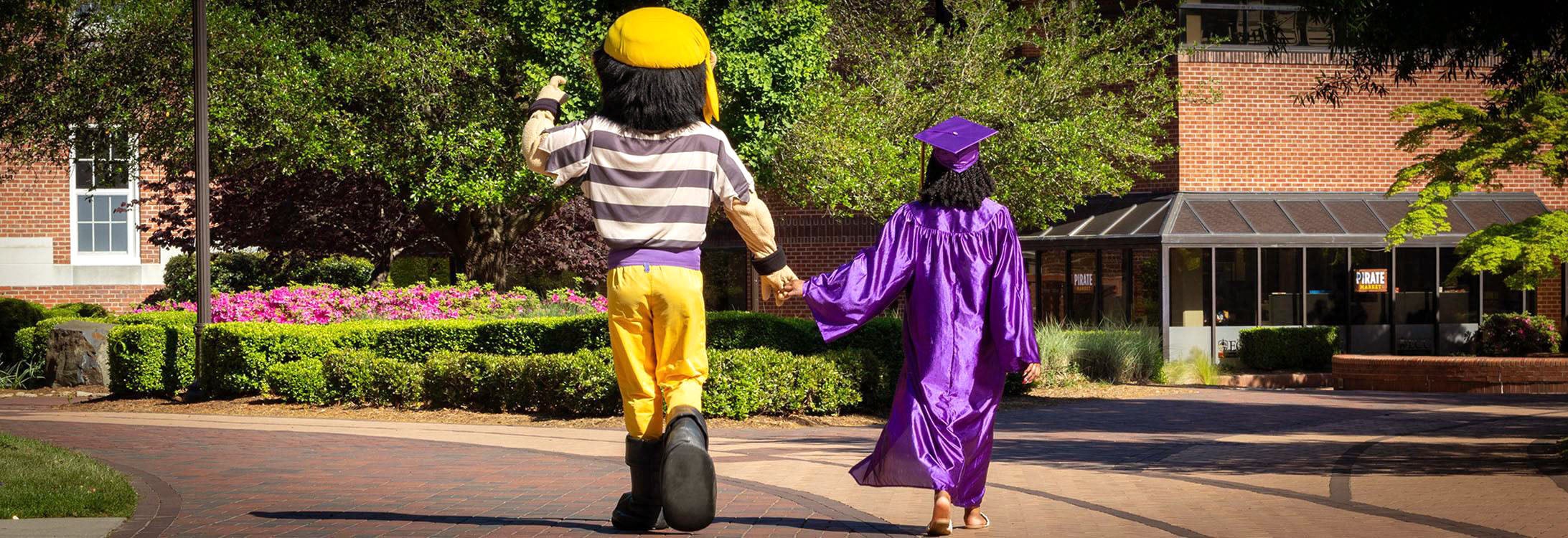ECU Cares
If you encounter a situation that poses an immediate threat to anyone’s safety or well-being, such as violence towards oneself or others, please report it immediately to ECUPD at 252-328-0062 or to the local law enforcement agency in the area the student is located.
East Carolina University is dedicated to supporting the well-being of our entire campus community, including students, faculty, staff, and visitors. We understand the various stressors that individuals may encounter, and in response, ECU Cares is committed to offering early intervention and support. Our goal is to address concerning behaviors and individuals in distress by providing access to essential resources, following up on their needs, and collaborating with campus professionals to effectively manage these situations.
Our Mission
The ECU Cares Team, under the Office of the Dean of Students, is dedicated to assisting students who are experiencing distress or displaying concerning behaviors. Our mission is to connect them with the resources necessary for academic success and emotional well-being. We achieve this through:
- Case Management: We reach out to individuals in crisis or those exhibiting concerning behaviors ensuring they receive comprehensive support and assistance.
- Assess & Support: We conduct thorough behavioral assessments to make appropriate recommendations for campus and community resources tailored to address individual concerns.
- Fostering Self-Advocacy: We help students develop skills to advocate for themselves and successfully navigate their challenges.
By offering these services, ECU Cares strives to create a supportive environment where all members of our university community can thrive.
Behaviors of Concern
As a valued member of the ECU community, you play a crucial role in helping us maintain a supportive and safe environment. If you observe anyone exhibiting concerning behaviors or signs of distress that may affect their academic, career, or personal well-being—or that could pose a potential safety risk to themselves or others—we encourage you to report these instances. Your vigilance and proactive engagement help us ensure that everyone receives the support they need to succeed and stay safe.
General Mental Health/Well-Being
- Emotional Distress Due to Life Changes or Significant Life Event
- Excessive Anxiety, Depression, Unexplained Crying
- Unusual or Erratic Behavior
- Clear Sign of Distress
Emotional Well-Being
- Difficulty Coping with Stressors
- Feelings of Hopelessness or Despair
- Mood Swings or Emotional Instability
Academic/Classroom
- Concerning Written Material or Class Discussion
- Excessive/Unexplained Absences (and is unresponsive to outreach)
- Experiencing Food Insecurity
- Experiencing Housing Insecurity
- Pregnancy or Parenting Concerns
Self-Harming Behaviors
- Plans to Complete Suicide or Recent Suicide Attempt
- Reported or Observed Self-Injurious Behavior or Threats
- Written or Verbal Expression of Suicidal Ideation
Safety Concerns
- Alcohol Abuse or Dependence
- Substance Abuse
- Engaging in Risky or Reckless Behaviors
- Choking or Strangulation
Threatening Behaviors
- Homicidal Thoughts or Ideations
- Display or Use of Weapon
- Fascination with Violence, Weapons, Fire or Ammunition
- Direct Statements Threatening Harm to Others
- Other Threatening and Concerning Behaviors – Click Here
Our Team
Members of the team include individuals/representatives from the following areas:
- Student Health Services
- Director of Threat Assessment & Case Management
- Case Manager(s), Office of the Dean of Students
- Advisory Capacity: Office of University Counsel
Frequently Asked Questions
How do I know if a concern is serious enough to report?
We recommend referencing the “Behaviors of Concern” list as a guide when considering making a report, however, prefer you err on the side of caution. If you are concerned, please report it. Let us determine the appropriate action.
Will the person of concern find out that I reported them?
Your privacy is important to us. Information about the reporting party will not be disclosed to the individual. However, please be aware that, in some cases, the individual may infer the reporter’s identity based on the details of the situation. The case manager will not verify or address any assumptions made by the concerned party.
Where do I report a Sexual Assault?
To report an incident of discrimination or harassment based on protected class, or incidents such as sexual assault, dating violence, domestic violence, or stalking, please complete the Equal Opportunity and Title IX Concerns & Complaints.
What happens after I submit a report?
Once received, a non-clinical Case Manager will initiate contact to identify students in need. They will conduct assessments and provide early interventions tailored to their concerns, aiming to connect them with appropriate campus and community resources. To protect the individual’s privacy, you will not receive any follow-up regarding your concern unless additional information is needed by the Dean of Students Office.





